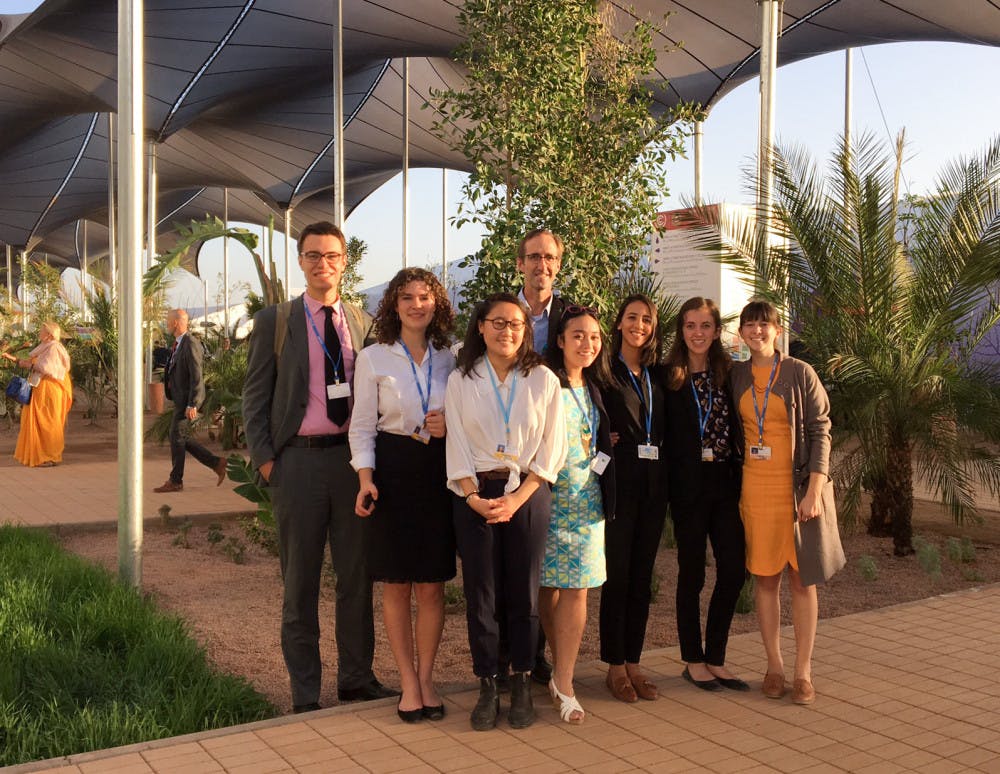Students enrolled in ENVS 1575: “Engaged Climate Policy at the U.N. Climate Change Talks,” a course offered every fall, recently returned from Marrakesh, Morocco, where they attended the United Nations Framework Convention on Climate Change. The students traveled in two groups over the two weeks the conference took place from Nov. 7 to Nov. 18.
The UNFCCC is an annual conference in which all the countries signed onto the U.N. framework convention come together to negotiate agreements on climate change, said Professor of Environmental Studies Tim Roberts.
“About 196 countries have signed on, including the (United States), and it’s a basic agreement in which all the climate discussions and negotiations have occurred since ’92,” he said.
Students in the class researched a variety of subjects related to the topics of negotiation at the conference and used their research to work with intergovernmental agencies, negotiating groups and climate action networks. One group of students released a report through AdaptationWatch, a global network group. Roberts also co-authored two policy briefings.
Last year’s conference led to the Paris Agreement, a new system in which countries come together with their own pledges concerning their fair share toward protecting the climate.
“The first week (at this year’s UNFCCC) was people figuring out if the election was going to be a really big problem or not because (President-Elect Donald Trump) has threatened to cancel the Paris Agreement,” he said.
Though Roberts does not believe the president-elect will go through with his promise, the actions Trump will take remain unclear. “Certainly the world will go ahead without the (United States). They’ve done it before when we pulled out of the Kyoto Protocol,” he said.
Sarah Stillman ’17 reported heightened tension at the conference following the election. Like Roberts, Stillman does not believe the world will reverse course on plans to battle climate change without U.S. cooperation.
“It was very clear from the other countries that whatever we do in the (United States) is not going to affect their actions on climate change,” she said. “Things are still going to happen even if it’s the worst-case scenario for the (United States).”
Other students were shocked to witness the magnitude of the conference’s size and structure. Though the UNFCCC included up to 20,000 people, Caroline Jones ’19 found the smaller negotiation groups to be more interesting based on the number of delegates in every country.
“The conference, in actuality, (was) more like 50 mini-pavilions where people would meet in smaller groups to hash out the details of different parts of the text. Everyone’s all over the place — countries that have these big delegations have the advantage. … Smaller countries with only 10 delegates can’t be at all the meetings, so they can’t have a voice in all the divisions. It was interesting to see how fragmented (the delegation) is,” Jones said.
Admission into the course is competitive. There have been approximately 50 applicants each year for a limited 12 spots over the last few years, Roberts said.
Since expenses are covered by the University through the environmental studies program, two-thirds of the students admitted are environmental studies concentrators.
As for other applicants, diversity of experience and skills is vital. “It’s tough because there (are) a lot of great applicants. I look for people who have language skills. In the past, we worked in Latin America, so Spanish was important. This time, French and Arabic (were important) because it was in Morocco,” he said. Roberts also looked for students with a background in development studies since the class is heavily centered on the field.
Students praised the way Roberts and his course prepared them for the conference. “To some extent, nothing can really prepare you for being there, but in terms of content, it was definitely useful,” Stillman said of being in the course. “We had all the technical knowledge and background to understand what was happening at the negotiations. If you (just) went in without taking one of Tim’s classes, you wouldn’t know what the hell was happening.”





